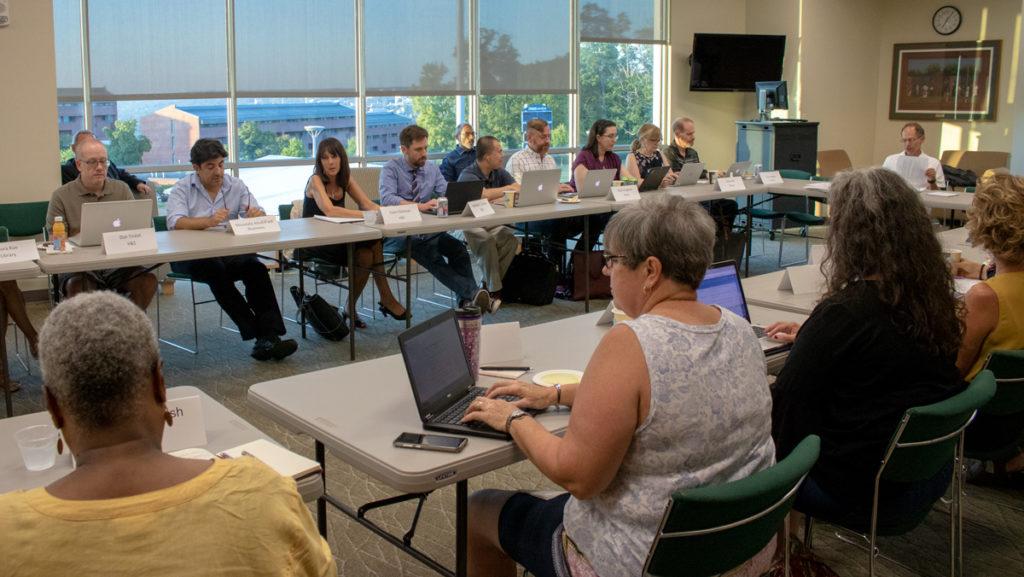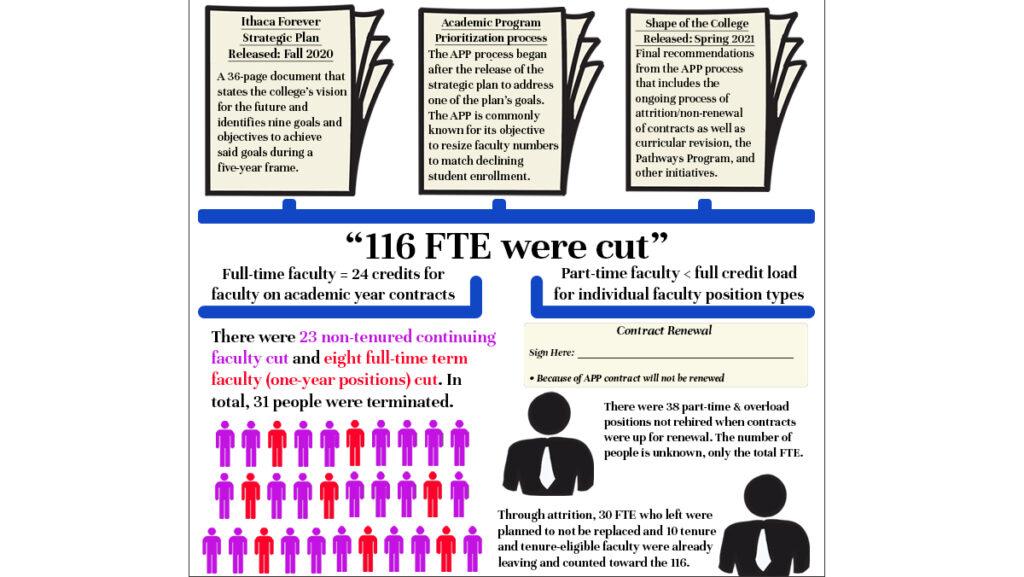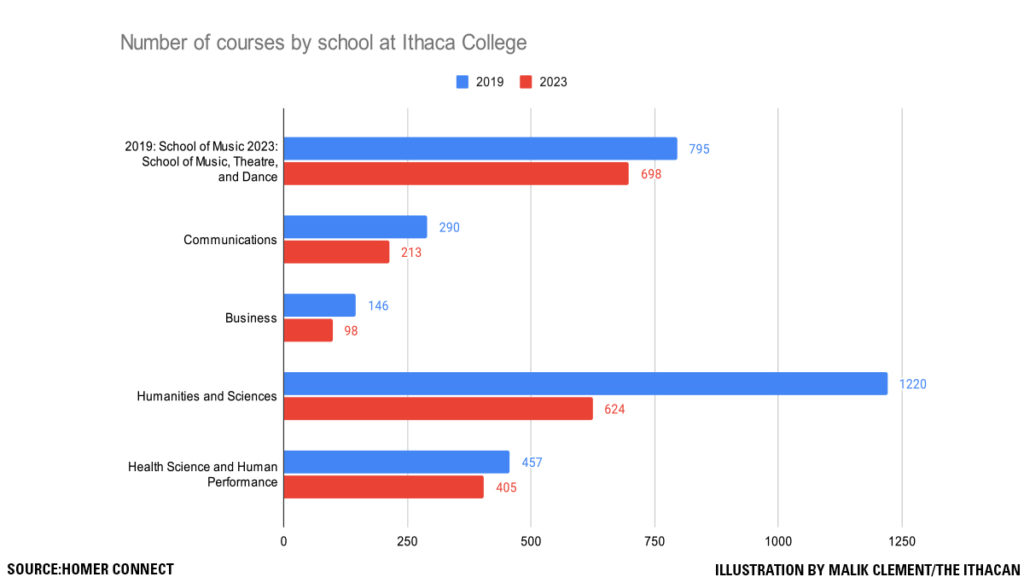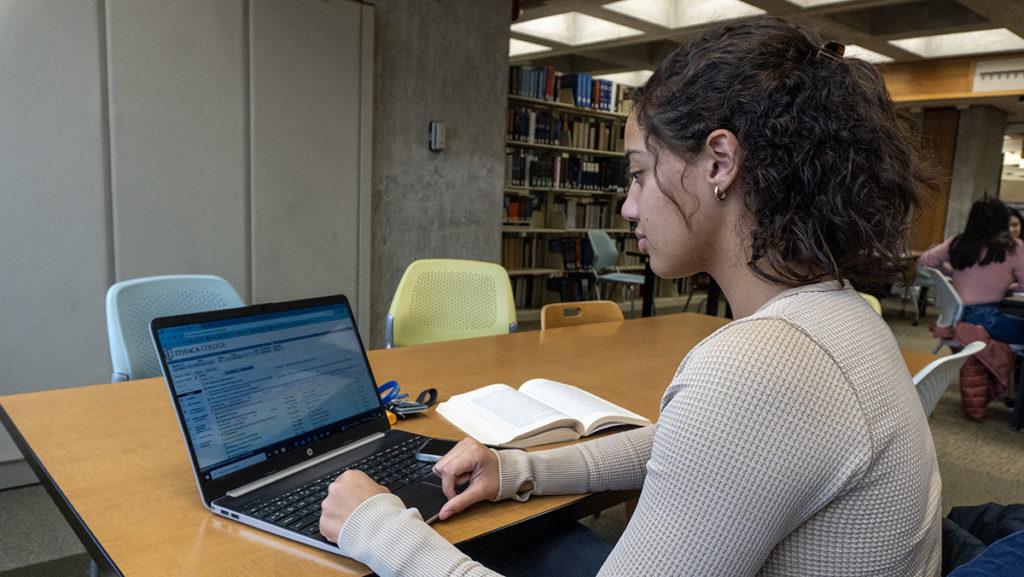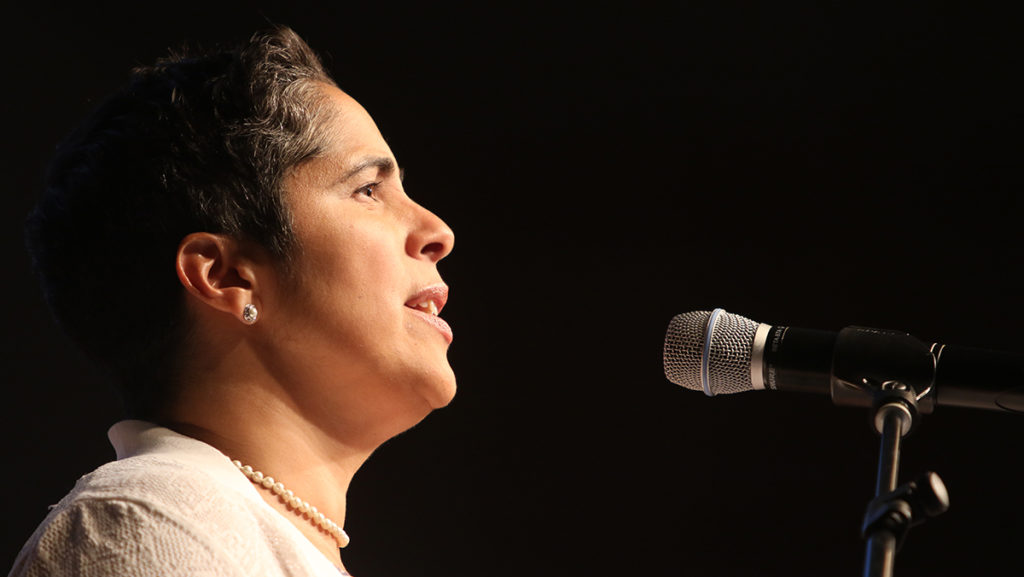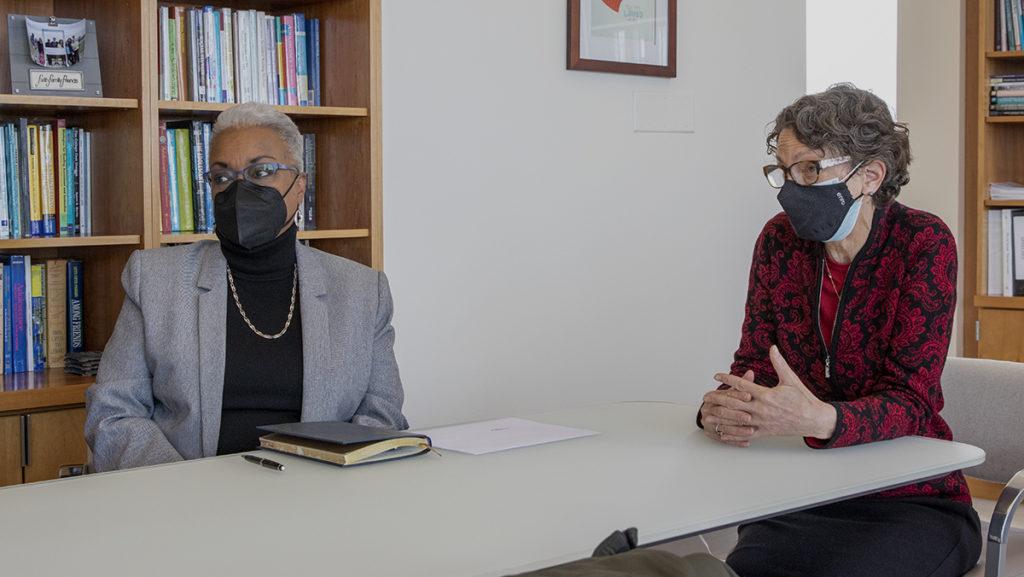Members of the Ithaca College Faculty Council expressed confusion and dissatisfaction with the administration’s recommendations for program and department cuts at the Faculty Council meeting Jan. 19.
The “Shape of the College” report is a draft document produced by the Academic Program Prioritization Implementation Committee (APPIC) that gives recommendations for departments and programs to be discontinued, consolidated, restructured or expanded as part of the Academic Program Prioritization (APP) process. In October 2020, La Jerne Cornish, provost and senior vice president for academic affairs, announced that 131 full-time equivalent (FTE) faculty positions would be cut as part of the Ithaca Forever strategic plan. The plan has been accelerated due to the COVID-19 pandemic’s effects on the college’s finances, Cornish said. The draft document recommends the elimination of 116 FTE positions.
The council went into executive session with a unanimous vote to discuss the draft document and generate questions in breakout groups for an all-faculty meeting Jan. 21. Cornish said she will be requesting the council go into executive session when faculty have questions about sensitive topics.
The council discussed the questions generated in each breakout group when the meeting returned to the main session. Chris McNamara, clinical associate professor and clinic director in the Department of Physical Therapy and chair of the Faculty Council, compiled a list of questions based on the common themes of faculty members’ concerns to ask at the all-faculty meeting.
The list of questions include how much money is being saved from faculty cuts, how will the process affect the college’s budget, how were FTE numbers generated, how much will faculty feedback impact the final decisions, why are faculty already being laid off if this is only a draft document, how will the college compensate for losing graduate student workers whose programs were discontinued, how will curriculums be changed, who will be responsible for restructuring the curriculums, how will the process of switching a course from three credits to four credits work, what will the rest of the APP process be and what will administration do about low morale among faculty?
The APPIC released the draft Jan. 13, and deans, faculty and program directors can provide feedback throughout January. A completed document will be given to President Shirley M. Collado and Cornish in early February. Final decisions will be made in late February.
The impact that faculty feedback will have on the APP plan was a recurring question among Faculty Council members. Some members put forth an idea to hold a vote that will convey faculty’s approval of the “Shape of the College” report. This vote would include the entire faculty body.
Rebecca Lesses, associate professor and Jewish studies coordinator for the Department of Philosophy and Religion, suggested a vote of no confidence in the administration but later described her comment as “flippant.”
McNamara said she believes a vote of no confidence would be a poor decision for the college.
“A vote of no confidence in the administration right now could be really harmful for the college in terms of prospective students and donors and that kind of thing,” McNamara said.
No confidence votes are held when groups within the college community believe that the president is ineffective in running the college. The votes are symbolic because the Ithaca College Board of Trustees only have the power to remove a president from their position. Students, faculty and staff held no confidence votes for former president Tom Rochon after students held protests against racism on campus, and the college community believed that Rochon was unfit to change the campus climate and lead the college.
A letter from faculty members who identify as Black, Indigenous and people of color was addressed to the Faculty Council and asked the council to be mindful of race and gender bias when criticizing members of the Senior Leadership Team. The authors of the letter said that they believe the administration should not have to experience gendered and racial attacks and that these attacks also affect other people in the college community who identify as Black, Indigenous and people of color.
“You may see us as separate from our Senior Leadership Team and the BIPOC women who help lead our College; we do not,” the letter reads. “BIPOC individuals have never had the option of seeing ourselves as individuals. After all, if you treat people in positions of power this way, how will you treat the most marginal amongst us?”
There was no discussion among the Faculty Council about the letter; although Jack Wang, associate professor in the Department of Writing, later expressed that he experienced racial attacks during a discussion about faculty of color at the Dec. 3 Faculty Council meeting.
“One of the points made was, ‘What about merits? I want to talk about the merits of retaining BIPOC faculty and the merit of the faculty that we retain,’ the subtext being, I think, quite insidious, that BIPOC faculty are less qualified for their positions,” Wang said. “I experienced that as hostile.”
The APP process has the potential to disproportionately affect faculty of color because they are more likely to be in contingent rather than tenured positions.
The council also questioned how the college will increase revenue, especially in regard to enrollment and retention. Fall 2020 undergraduate enrollment decreased to 4,957 students from 5,852 in Fall 2019 and 6,101 in Fall 2018, according to the Office of Analytics and Institutional Research (AIR).
Aaron Witek, assistant professor in the Department of Performance Studies, said he is concerned that discontinuing and consolidating departments will further decrease enrollment.
“The thing I want to ask is, ‘What brings students to Ithaca College?’ and it’s my understanding that it’s our faculty, our programs,” Witek said. “So then what pushes students away? What pushes students away is that the programs are going to become weaker, the curriculum becomes weaker and the environment that we are in right now is toxic.”
Several Faculty Council members attributed low enrollment to the work of members of the Senior Leadership Team (SLT). Phil Blackman, assistant professor in the Department of Accounting and Business Law, said he believes Laurie Koehler, vice president for marketing and enrollment strategy, should be held accountable for the low enrollment.
“I’m so frustrated with hearing someone who has a compensation package over $200,000, whose position is the VP, telling me that they need more time to kind of get a feel for how they do their job,” Blackman said. “It’s just completely unacceptable.”
Koehler started in the position in July 2019, so the most recent Form 990, which encompasses June 1, 2018 to May 30, 2019, does not include her salary. No members of the Senior Leadership Team have released their salaries despite repeated requests from The Ithacan. Enrollment began declining after Fall 2015 when 6,769 graduate and undergraduate students were enrolled, according to the AIR. There were 6,678 students enrolled in Fall 2016 and 6,516 in Fall 2017. Enrollment decreased more rapidly after 2018, dropping from 6,517 in Fall 2018 to 6,266 in Fall 2019. Fall 2020 saw another drop in enrollment with 5,354 students. This drop was caused in part by the COVID-19 pandemic.
Koehler said the Marketing and Enrollment Strategy team is concerned about the college’s enrollment over the past decade and is working to address the low enrollment. The team has developed a new recruitment campaign and new virtual engagement opportunities for prospective students.
She said the Remote Engagement Strategy team is working to improve the college’s retention and graduation rates.
“Strengthening the student experience in and out of the classroom, building community and eliminating barriers to student success will allow us to change the fact that we are losing 25% of the students who initially enroll and thus will strengthen the college’s overall enrollment,” Koehler said via email.
James Miranda, lecturer in the Department of Writing, also said he believes the college has been ineffective in bringing in revenue through enrollment and alumni engagement. The number of alumni making donations to the college has decreased by approximately half since 2010, as of December 2019.
“Part of this [institution’s] problems, and this is a delicate charge to make, is that this administration is just making horrible hires,” Miranda said in the Zoom meeting chat. “The advancement office is virtually nonfunctional under Wendy Kobler — that entire office has their resumes out elsewhere as a result. … There is an essential problem with recognizing and recruiting talent into these positions.”
Kobler said she is proud of the Division of Philanthropy and Engagement for the work it has accomplished since she started in her position in September 2019. The division has created a five-year strategic plan for increasing alumni, family, friends and student engagement with the college.
“Even with reduced staffing in the division, the team has managed to engage constituencies creatively and productively,” Kobler said via email. “We are eager to continue that hard work in the new year and to continue to serve the needs of our students.”
Blackman said he does not believe that a vote of no confidence in the administration would help the college but said faculty should consider holding administration accountable for the loss of jobs.
“It’s a complex question, but I suspect that maybe we should start thinking about when we’re going to hold leadership accountable because we’re the ones that are paying now,” Blackman said. “We’re the ones that will pay.”


